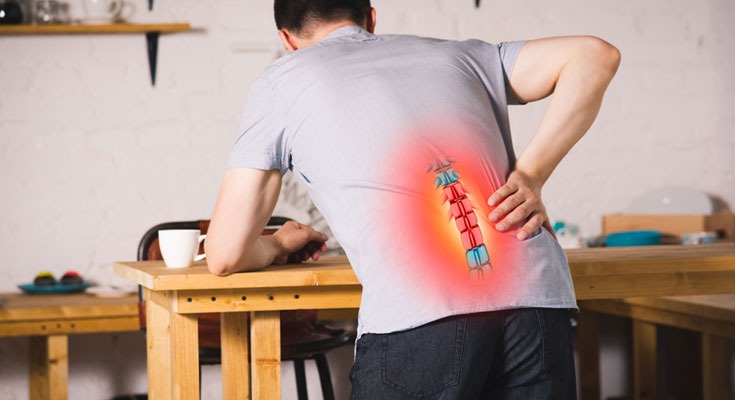A herniated disc refers to a problem that where one of the rubbery cushions (disc) that’s between the bones, that make up your spine. The spinal disc has a soft, jelly life center, covered in a tougher rubber-like exterior. A herniated disc happens when some of the jelly-like substance starts leaking out due to a tear. This is also called a slipped disc or a disc bulging.
A herniated disc can happen in any part of your spine, but most of the time it happens in the lower back. Based on where the herniated disc is, it can lead to several symptoms such as pain, numbness, weakness in your arm or leg. Hundreds of people that suffer from herniated discs don’t even feel any symptoms. For those who do feel the symptoms, their symptoms improve over time. Surgery isn’t necessary to relieve the disc bulging problem, but it is one of the most common methods of pain relief.
Symptoms of Herniated Disc
Most cases of herniated disc happen in the lower back, but sometimes they also happen in the neck. Signs and symptoms depend on where the disc bulging happened and whether the disc is pressing on a spinal nerve. Here are some of the most common herniated discs:
- Arm or Leg Pain: If your herniated disc is in your lower back, then you’ll feel pain in your lower back, your buttocks, thigh, and calf. You may also feel some pain in your leg. If you have a disc bulge in your neck, you’ll typically feel the most pain in your shoulder and arm. This pain may shoot into your arm or leg when you cough or move into specific positions. Most people describe the pain as a sharp or burning sensation.
- Numbness or Tingling: Another symptom of the herniated disc is radiating numbness or tingling sensation in the body part that’s affected by the pinching of the nerves.
- Weakness: Muscles served by affected nerves often become weak. This can cause you difficulty in moving, or affect your ability to hold items.
You can have a herniated disc without symptoms, some people never figure it out until they get a test done.
Causes of Disc Bulging
Disc herniation is more than often a result of old age-related wear and tear. As people age, the discs become less flexible and more prone to tearing or rupturing. Even a minor strain or injury can set it off.
Most people can’t pinpoint the cause of their herniated disc. Sometimes, use the back muscles instead of the leg and thigh muscles to lift heavy objects. All of this can easily lead to a herniated disc, as can twisting and turning while lifting. Sometimes, a major injury or a blow to the back can cause a disc bulge.
Risk Factor of Disc Bulge
Some risk factors can increase your chances of disc bulging. Here are some of the major risk factors that you should be aware of:
- Weight: Extra body weight causes additional stress on the disc in the lower back.
- Occupation: Certain jobs can lead to disc bulging. People that have physically demanding jobs are at a greater risk of having back problems. Repetitive lifting, pulling, pushing, twisting, and more can increase your risk of a disc bulge.
- Genetics: While it happens rarely, some people do inherit the genes that lead to a herniated disc.
- Smoking: As smoking lessens the oxygen supply in your body, it can impact the oxygen supply in discs as well, causing them to break down more frequently.
- Frequent Driving: If you’re in the profession of driving for a longer period of time, the vibration of the motor vehicle engine can put pressure on the spine. This ultimately leads to disc bulging.
- Being Sedentary: If you don’t exercise regularly, you can prevent the risk of having a herniated disc.
Complication of Disc Bulging
Rarely, does disc herniation can compress the complete spinal canal, this includes all the nerve roots in your spine. In rare instances, emergency surgery may be needed to avoid permanent damage or weakness.
If you have been feeling the symptoms, then you should seek medical attention:
- Worsening symptoms: Pain, numbness, or weakness to a point that they affect your daily activities.
- Bladder or bowel dysfunction: Pinching of your root nerves can often lead to difficulty urinating even with a full bladder.
- Saddle Anesthesia: This progressive loss of sensation affects the areas that would touch a saddle. In simple terms, inner thighs, back of the legs, and the areas around your rectum.
How to Prevent Disc Bulging?
Not a lot of people know it, but there are some simple things that you can do to prevent a herniated disc. Here are the things that you need to do:
- Exercise: Regular exercising can strengthen the trunk muscles stabilize and support the spine.
- Maintain good posture: Having a good posture can reduce the pressure on your spine and your disc. Keep your back straight and aligned, especially when you have a job that requires you to sit for long periods. Lift heavy objects properly, lift with your legs not your back to prevent damage.
- Keep a healthy weight: Excess weight puts a lot of pressure on the spine and discs, which makes them more susceptible to herniation.
- Quit smoking: Smoking is a risk factor for herniated discs, so if you smoke then it may be the right time to quit smoking.

